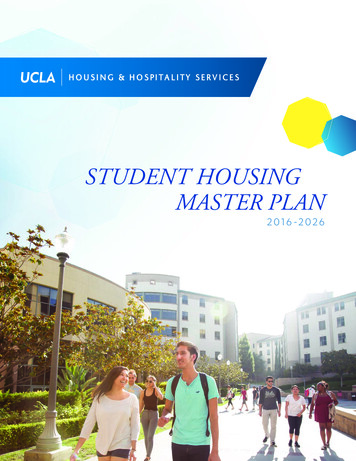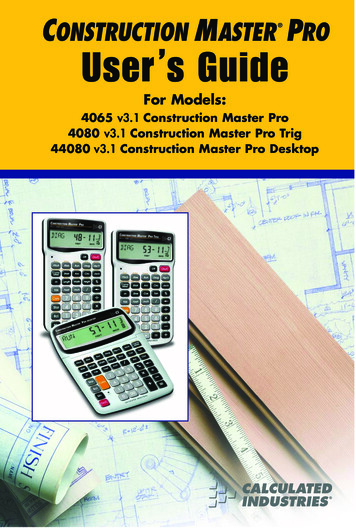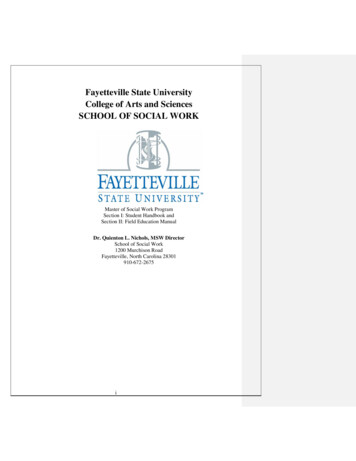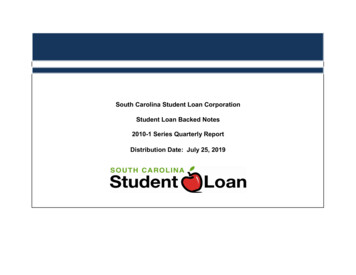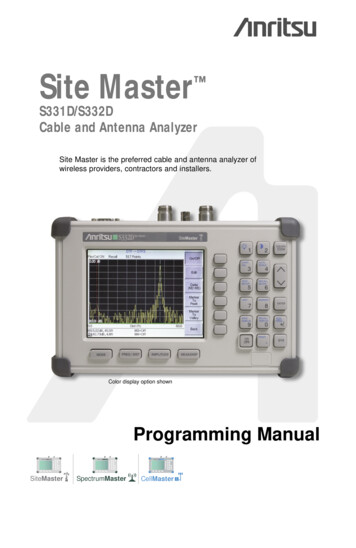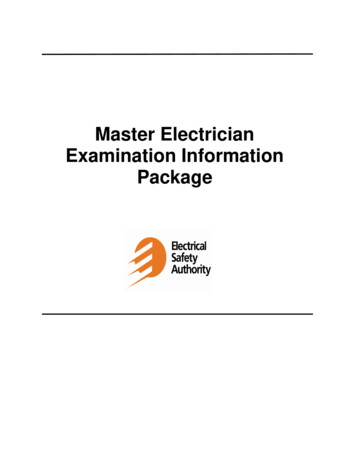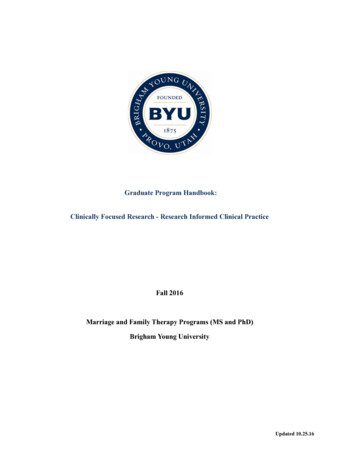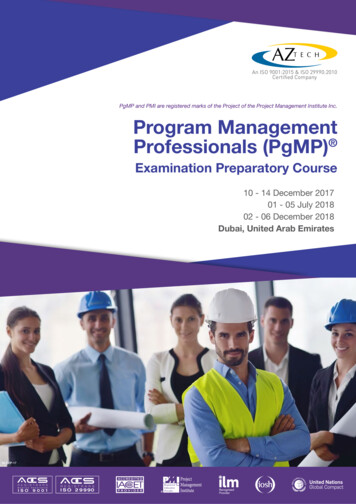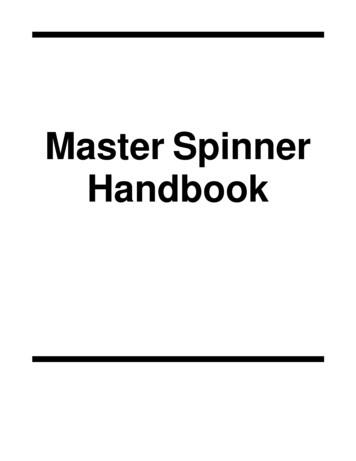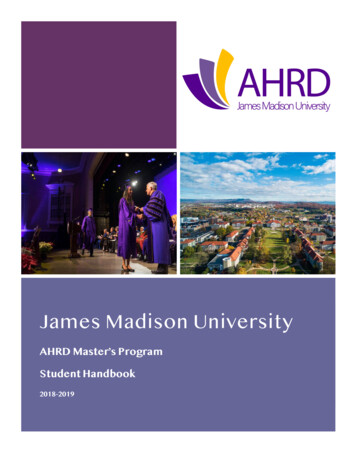
Transcription
James Madison UniversityAHRD Master’s ProgramStudent Handbook2018-2019
HANDBOOK TABLE OF CONTENTSContentsUse It – Don’t Lose It! . 5About the Program . 5The Master’s Program . 5AHRD FACULTY INFORMATION. 6AHRD FACULTY BIOS . 8Dr. Diane Wilcox, Learning, Technology, & Leadership Education Interim Department Head 8Dr. Noorie Brantmeier, AHRD Graduate Program Director. 8Dr. Michele Estes . 8Dr. Oris T. Griffin . 8Dr. Richard Ingram . 9Diana Meza . 9Randy Snow . 9Course Descriptions . 9Degree Requirements . 14Core Courses . 14Individualized Concentration. 15Sample Program Plans. 15Philosophy of Education. 15Mission, Objectives, Expectations, & Advising . 17Mission . 17Program Objectives . 17Expectations for Students . 17Academic Achievement . 18Personal Growth and Self-Awareness . 18Ethical and Professional Behavior . 18Advising . 18Program Involvement . 18Comprehensive Examinations . 19Communication . 19Email . 20Website . 20AHRD Graduate Student Handbook 2018-20192
Canvas . 20Dinners/Meetings . 20Course Evaluation . 20Student Progress & Retention . 20Meetings with Your Adviser . 20Meeting with a Faculty Team . 21Transition Out of Program . 21Policies & Deadlines . 21Grades . 21Course Load. 22Professional Portfolio . 22Qualifying Examination .Error! Bookmark not defined.Oral Comprehensive Examination. 22Course Checklist. 22Application for Graduation . 23Reading and Research or Thesis . 23Purpose. 23Types of Research Projects . 23Meetings . 24Committee . 24Thesis or Reading & Research Paper . 24Deadlines . 25Evaluation Criteria. 25Oral Comprehensive Examination . 25Transcript and Written Analysis . 26What the Oral Examination Entails . 27Evaluation Process . 27Winning at Oral Comps! . 28Preparation . 28Perfecting Your Transcript and Written Analysis. 29During Your Oral Examination . 30If You Do Not Pass Comps . 31References & Job Search . 31AHRD Graduate Student Handbook 2018-20193
Financial Aid. 32Assistantships . 32Loans and Other Financial Aid. 35University Business Office . 35Office of Financial Aid and Scholarships . 36AHRD Graduate Program Checklist . 37Comprehensive Examination Rating Form . 38AHRD 680 Reading and Research Project Proposal . 44Reading and Research Rubric . 45Thesis Rubric . 51AHRD Graduate Student Handbook 2018-20194
Welcome to Adult Education/Human Resource Development (AHRD) at James MadisonUniversity! You are now a member of an active, vital learning community of dedicated students andfaculty members who are committed to the profession of Human Resource Development. We aredelighted to have you on board!Use It – Don’t Lose It!The purpose of this handbook is not just to help you survive graduate school, but also to help youthrive here. Read it carefully, keep it handy, and don’t lose it! You will need to refer to thishandbook regularly throughout your program. The handbook provides you with more than just thepractical information you need about programs, policies, and procedures. It also offers helpful hintsand suggestions on gaining the most from the opportunities that our AHRD program at JMU has tooffer you. Take advantage of the handbook by using it faithfully – and give something back inreturn by letting us know how we can improve future editions.About the ProgramAHRD is part of the College of Education at James Madison University. The Master of Science inEducation degree with a major in AHRD is designed for persons entering or advancing in positionsassociated with learning in education, business, industry, government, and other public and privatesector organizations. The program is targeted to college graduates pursuing a career in the AHRDfield, experienced AHRD professionals who want to expand their skills and enhance their careerpotential, and working managers and professionals in leadership roles where skills in developing andleading people have become critical to their organizations’ success. A major strength of the programis that it allows individuals to tailor their programs to personal and career needs and objectives.The Master’s ProgramThe master’s program is both technically and theoretically oriented with an emphasis on systemsthinking, organizational analysis, and performance improvement. The program leads to a Master ofScience in Education (M.S. Ed.) degree.Concentration areas for AHRD include the following defined areas of study: leadership andfacilitation, technology, evaluation and measurement, human resource management, and highereducation. Through an individualized concentration and with the help of an adviser, students canalso define a concentration in other areas of study, such as public administration, counselingpsychology, secondary education, or any content area that is complementary to the learners’professional and personal objectives.AHRD Graduate Student Handbook 2018-20195
AHRD FACULTY INFORMATIONWilcox, Diane (Dr.) – Professor, Interim LTLE Department HeadOffice Number: MEMH 3310BExt: 8-6707Email Address: wilcoxdm@jmu.eduBrantmeier, Noorie (Dr.) – Assistant Professor, HRD/AHRDAHRD Graduate Program DirectorOffice Number: MEMH 3325EExt: 8-4530Email address: brantmnk@jmu.eduEstes, Michele (Dr.) – Associate Professor, Educational TechnologyOffice Number: 3325CExt: 8-4311Email address: estesmd@jmu.eduGriffin, Oris T. (Dr.) – Professor, AHRDOffice Number: MEMH 3345DExt: 8-6453Email Address: griffiot@jmu.eduIngram, Richard E. (Dr.) – Assistant ProfessorOffice Number: MEMH: 3350DExt: 8-6965Email Address: ingramre@jmu.eduMeza, Diana – Instructor, HRDJMU-USAL Dual Degree Graduate Program DirectorOffice Number: MEMH: 3325FExt: 8-5917Email Address: mezadx@jmu.eduSnow, Randy – Instructor, HRD/AHRDOffice Number: MEMH 3345BExt: 8-8842Email Address: snowrs@jmu.eduAHRD Graduate AssistantOffice Number: MEMH 3345Ext: 8-2632AHRD Graduate Student Handbook 2018-20196
The Adult Education/Human Resource Development Program’s missionis to prepare professionals to design, implement, evaluate, and leadappropriate interventions that promote learning, development, andperformance improvement in settings where adults learn and work.In addition to delivering effective instruction, Adult Education/HumanResource Development professionals are also prepared to design methods tofacilitate change and develop programs to enhance productivity and increasesatisfaction for all employees.We are a community committed to preparingstudents to be educated and enlightened citizenswho lead productive and meaningful lives.-JMU Mission StatementAHRD Graduate Student Handbook 2018-20197
AHRD FACULTY BIOSDr. Diane Wilcox, Learning, Technology, & Leadership Education Interim Department HeadDr. Diane Wilcox is an Associate Professor and the Interim Department Head for the Departmentof Learning, Technology and Leadership Education. She began her HRD career in technical training,technical writing, and technical illustration in 1980 with Cal-Q-Tax, the first tax planning software.From the mid-1980s through 2004, she worked for a number of software companies as graphicdesigner, instructional designer, technical writer, instructional design manager, and training manager.Her product, Mindforge Fractions, was named one of the top 100 children’s products for 1998 byDr. Toy. Dr. Wilcox earned her master’s and doctoral degrees in Educational Psychology at theUniversity of North Carolina at Chapel Hill, and a B.B.A. in business administration from theCollege of William and Mary. She teaches instructional technology, visual communication,instructional design, and research methods. She is interested in the use of games and technology intraining, and conducts research on the effect of chronic Lyme Disease on workplace performanceand learning.Dr. Noorie Brantmeier, AHRD Graduate Program DirectorDr. Noorie Brantmeier is an Assistant Professor and the Director for the AHRD Graduate program.Her career in human resource development has focused on organizational capacity building withNative American organizations and the federal agencies that serve these communities. She hasextensive experience as a consultant and is a founding partner of a national consulting firm, SevenSisters Community Development Group, LLC. Dr. Brantmeier has experience as an externalevaluator, researcher, project manager, curriculum developer, trainer, facilitator and grant writer. Sheearned her Ph.D. in Adult Education and Human Resource Studies from Colorado State University,a master’s degree in Social Work from Washington University in St. Louis, and a bachelor’s degreein Social Work from Indiana University. Her research interests include human resource developmentin Indigenous context; student competency development through project-based learning in theHRD classroom, and she collaborates on many mixed methods research project teams. Dr.Brantmeier teaches both undergraduate and graduate level courses.Dr. Michele EstesDr. Michele Estes earned a Ph. D. in Instructional Technology from The University of Georgia,where she also coordinated the design and development of instructional multimedia formultidisciplinary faculty teaching and research. For fifteen years she worked in corporate and highereducation in a variety of roles including but not limited to publications editor, technology trainer,instructional designer, multimedia developer, course developer, and project coordinator. Insecondary schools, Dr. Estes has served as a substitute teacher and volunteer. Her research interestsinclude the diffusion of innovations in education, universal design for learning, and humancomputer interactions. Dr. Estes currently teaches Educational Technology courses at theundergraduate and graduate levels at JMU.Dr. Oris T. GriffinDr. Griffin is a Professor of Human Resource Development. She holds degrees from WinstonSalem State University and Western Michigan University. Dr. Griffin came to JMU in 1990 andteaches both undergraduate and graduate courses in adult learning and leadership. Her academicinterests focus on adult education, diversity, and leadership training and facilitation.AHRD Graduate Student Handbook 2018-20198
Dr. Richard IngramDr. Richard Ingram serves on the Educational Technology faculty of James Madison University(JMU) and as Director of the JMU/Microsoft Partnership for 21st Century Skills. As Director ofthe JMU Partnership, he is at the forefront of efforts to bring performance certification totechnology use in education, as well as to explore the implementation of programs addressing 21stCentury Skills, in collaboration with the national Partnership for 21st Century Skills. His proposalshave received more than seven million dollars in external funding, addressing areas such as virtualreality, web video, technology use in education, and artificial intelligence. He is currently working onneuroscience research. Prior to coming to JMU, he was a corporate consultant specializing intechnical training and performance-based systems.Diana MezaDiana is an instructor in the Department of Learning Technology and Leadership Education and theDepartment of Modern Foreign Languages, Literatures, and Cultures. A native of Colombia, Dianahas a Bachelor in Business Administration and a Master’s in Education in Adult Education andHuman Resources from James Madison University. She currently teaches Adult Learning Theories,Development of Materials and Programs, Diversity in Education, Inquiry in Education, and Spanish.In addition, she serves as the Director of the JMU Dual Master’s Degree with the University ofSalamanca, Spain in Education with a concentration in Spanish Language and Culture. As a Ph.D.candidate, Diana is interested in effective communication between bilingual and/or biculturalparents and teachers of ELL students. In her free time, she enjoys playing golf, reading and travelingaround the world.Randy SnowRandy Snow received his master’s degree in Adult Learning/Human Resource Development fromJames Madison University in May of 2006 and received his BS in education from Eastern MennoniteUniversity. He has over 12 years of experience in the corporate sector working for pharmaceuticalcompanies Merck and PRA. His main duties included process analysis, process improvementinitiatives, corrective and preventive actions, root cause analysis and the development and reportingof business metrics.Course DescriptionsAHRD 501. Workshop in AHRD. 1-3 credits.Designed to provide workshop experience in a variety of areas involving AHRD. Workshop contentwill be determined by demand, interest, and input from local, regional and state clientele. May berepeated up to six hours. (Offered rarely)AHRD 520. Foundations of AHRD. 3 credits.Historical beginnings of adult education and human resource development programs are examinedin order to understand current practices. Current issues and trends, research, legislation, andpublications will be incorporated into the course. (Offered every fall)AHRD 540. Leadership and Facilitation. 3 credits.AHRD Graduate Student Handbook 2018-20199
This course examines the multi-faceted concept of leadership and facilitation, focusing on facilitativeleadership approaches and how these contribute to organizational and individual performance.Traditional and emergent paradigms will be explored. Emphasis will be placed on knowledge,attitudes, and skills that enable a facilitator to work effectively with diverse work groups, enhancecreativity, and draw from organizational and community resources. (Offered every fall)AHRD 550. Human Resource Work Experience. 1-3 credits.Designed to provide learners a workplace learning experience that will reinforce their academiclearning to make it more meaningful, develop specific on-the-job skills, make the transfer of skillsand concepts to job applications more efficient, and increase the likelihood of successful transitionto the position of human resource development professional. (Offered fall, spring, summer)AHRD 560. Facilitating in AHRD. 3 credits.This course equips students to participate in and facilitate groups in organizational settings. Studentsexamine theories and tools for developing and supporting effective learning groups and will practicefacilitation skills. The course will address group dynamics, clarification of group task/agenda, andmeeting goals. (Offered rarely)AHRD 575. Diversity and Ethics in AHRD. 3 credits.This course enables students to develop skills, insights, and a critical understanding of diversity,ethics, and global change in adult education and human resource development. Specifically, studentswill master the complexities of organization, delivery, and management of human resourcedevelopment programs in diverse, multinational, and global corporate settings. (Offered spring,summer)EDUC 641. Learning Theories and Practice. 3 credits.This course provides a comprehensive overview of learning in adulthood. Emphasis is placed onlearning contexts, what and why adults learn, the nature of learning, learning theories, adultdevelopment and the development of adult learning theory. Ways and means to enhance learningopportunities in the lives of adults at work, school, worship, in leisure, and for better health areexplored. (Offered fall, summer)LTLE 570. Design and Development of Digital Media. 3 credits.This foundational skills course introduces the processes for the design, development, anddistribution of digital media elements. Concepts introduced include technical terminology; filemanagement; computer-based learning, distance learning, and blended learning; the use ofcollaborative tools for learning; and practical applications in K12 and business. This course providesskills for future digital media development. (Offered fall, summer)AHRD Graduate Student Handbook 2018-201910
LTLE 580. Developing and Critiquing Visual Literacy. 3 credits.This course will cultivate the ability to evaluate and create conceptual visual representations.Students will practice the necessary critical attitude, principles, tools and feedback to develop theirown high-quality graphics for learning and performance. Topics also include the impact of visualliteracy on the learning process related to instructional design, instructional technology, andinformation presentation. (Offered spring, summer)LTLE 610. Principles of Instructional Design. 3 credits.Examines the overarching process of instructional design as it relates to the design, development,and implementation of technology-based instruction. Instructional design models will be comparedand contrasted, and students will be challenged to develop their own model that is appropriate forthe given workplace. Includes discussions on design methodologies, principles, and instructionalstrategies. (Offered every spring)AHRD 615. Needs Assessment and Program Evaluation in AHRD. 3 credits.Focuses on knowledge and skills basic to organization, process, and task analyses, includingapproaches and steps in identifying root causes of performance problems. Current performanceanalysis practices in AHRD will be discussed. Methods and techniques in developing specificinstruments for performance improvement data collection and data analysis will also be covered.Prerequisites: AHRD 520. (Offered every spring)AHRD 620. Consulting in AHRD. 3 credits.This course focuses on models, techniques, and practices of consulting skills in developing programsfor learners as individuals, groups, and organizations. Emphasis is placed on performance analysis,needs assessment, instructional design processes, approaches and practices, implementationprocedures, and evaluation approaches to various learning settings and clients. Prerequisites: AHRD520, AHRD 560, EDUC 641, AHRD 600, LTLE 570, LTLE 610, or equivalent or permission of theinstructor.AHRD 630. Research Methods and Inquiry in AHRD. 3 credits.This course provides students with knowledge and skills in research and inquiry. This course willfocus on different qualitative and quantitative research methods, research designs, approaches todoing literature reviews and analyses, and determining the size and scope of research projects. Datacollection instruments and analyses approaches will also be covered. Prerequisite: AHRD 520 orstudents in the stage of conducting R&R projects. (Offered spring, summer)AHRD 635. Organization and Administration of AHRD Programs. 3 credits.This course examines current and proposed legislation, program development, and organizationalstructures found in adult education and human resource development. Emphasis is placed onchanging existing structures to lifelong learner-driven structures. (Offered rarely)AHRD Graduate Student Handbook 2018-201911
AHRD 640: Program Evaluation and Measurement in AHRD. 3 credits.Focuses on theories and practices in evaluation and measurement of AHRD programs from theperspective of impact on organizations, work processes, and individuals, as well as follow-updecisions. Methods and processes in developing specific instruments for program evaluation datacollection and data analysis will also be discussed. Prerequisites: AHRD 520: Foundations of AHRD.(Offered summer, fall)LTLE 650. E-Learning Design. 3 credits.This advanced graduate course will address the theories, principles, instructional strategies, andsoftware applications used to create instructionally sound eLearning programs. The course contentincludes instructional design methodologies appropriate to the creation of e-learning programs, aswell as the selection and utilization of media elements that support and enhance the learningprocess. Students will develop skills in instructional analysis, instructional design, problem solving,project management, consulting, and teamwork while working with a variety of softwareapplications to build a cohesive eLearning program. This applied course will require students todevelop projects individually and as part of a design team. Prerequisites are EDUC 641 Learning Theoryand Instructional Models, LTLE 610 Principles of Instructional Design, and LTLE 570 Design and Developmentof Digital Media. (Offered fall, summer)AHRD 660. Facilitating Experiential and Action Learning. 3 credits.This course examines the historical roots of action learning, organizational learning, variousexperiential and action methodologies, and a thorough description of action learning including whatit is, key elements, when it works, organizational applications, and how it benefits the organization.Prerequisites: AHRD 540 or permission of the instructor. (Offered rarely)AHRD 670. American Higher Education. 3 credits.The objective and organization of prevalent types of institutions are studied. Current issues andproblems in American higher education are explored. (Offered fall)AHRD 671. Teaching and Learning Processes in Higher Education. 3 credits.Instructional practices and themes are studied in relationship to programs in higher education.(Offered summer)AHRD 673. The Community College. 3 credits.The history, function, and personnel of the comprehensive community college in the Americansystem of higher education are studied. Current issues facing the community college are explored.(Offered summer, spring)AHRD Graduate Student Handbook 2018-201912
AHRD 690: Special Studies in AHRD. 3 credits.Designed to provide students the opportunity to explore topics of special interest that are morelimited than the traditional three-credit course. Prerequisite: Approval of major adviser. (Offered fall,spring, summer)AHRD 695. Portfolio. 0 credits.Students enroll in this course during their final semester. Course is graded on pass/fail basis.(Offered fall)Research Course: Upon completion of all core coursework, students will choose a research course.They may take a one semester research course, AHRD 680 – Reading and Research, OR a twosemester research course, AHRD 700 – Thesis. Students only need to register for ONE of thesecourses.AHRD 680. Reading and Research. 3 credits.Designed to provide the opportunity for supervised reading and research in a special interest area ofAHRD. Prerequisite: Approval from major adviser and completion of a basic research course. (Offered spring,summer)AHRD 700. Thesis. 6 credits (split over 2 semesters).Designed to provide the opportunity for supervised research in a special interest area of AHRD.Prerequisite: Approval from major adviser and completion of a basic research course. (Offered fall, spring)Continuance Cours
AHRD Graduate Student Handbook 2018-2019 2 HANDBOOK TABLE OF CONTENTS Contents . Salem State University and Western Michigan University. Dr. Griffin came to JMU in 1990 and . James Madison University in May of 2006 and received his BS in education from Eastern Mennonite University. He has over 12 years of experience in the corporate sector .
